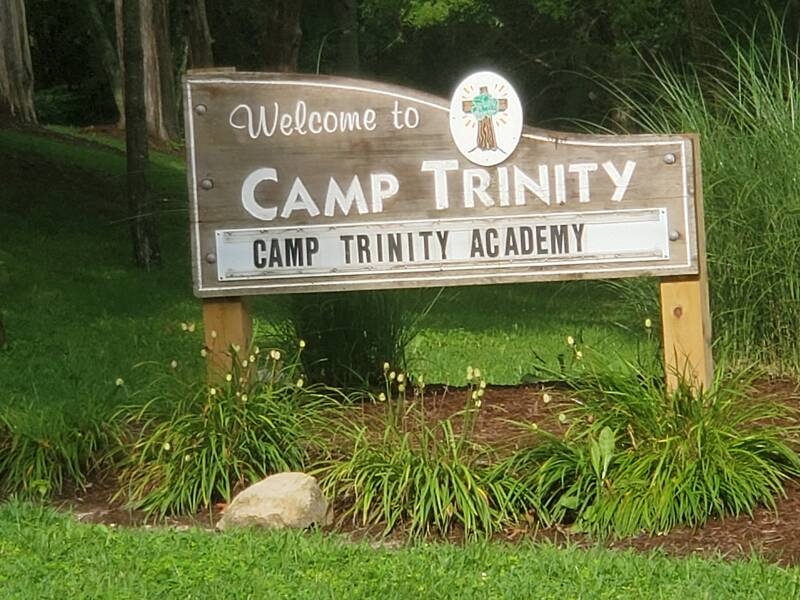The Following is a report given by Mason Laezza after our first year of camp in 2023. Mason attended the camp again in 2024:
Camp Trinity Academy. In a single word, brilliant. It was unlike any other religious camp that I had attended. The way that the content was presented was very engaging which made it much easier to understand. The content in our church history class was presented in the form of a board game. As we would play the game, Pastor Mueller would explain to us what was going on or why the actions we took in the game happened. This made the class much more hands-on. In Pastor Preus’ class, we looked at the LCMS doctrine through the Augsburg Confession. We would read the Augsburg Confession, next we would look at scripture related to the section we read, and finally we would have a discussion on that section. The last class, which was on the Old Testament, was taught by Pastor Wilshusen. We discussed the book of Psalms. We discussed their meaning, what they are for, and how to read them. We also looked at different bible translations and compared them to each other. Pastor Wilshusen also showed us the comparison between the different translations, and the original Hebrew. While the content was deep, the way that each pastor taught their respective classes made it very easy to understand. Between classes, we would have library time where we would read the passages that the pastors assigned. We also read books of our own interest. One of the more interesting parts of the camp was when Pastor Preus would take us with him for field work. It allowed us all to see the work of a pastor outside of the church building. Everyday, we would have freetime also. This was one of my favorite times of day, because I would be able to sit down, relax, and read a book (that I had personally chosen) in order to continue with my biblical education. This gave me a chance to engage one of my topics of interest and grow in my faith. We also had chapel three times a day, which gave each of us the opportunity to learn how to read scripture to people properly, and practice doing so. Overall, the camp was a great experience. It is something that I would highly recommend to anybody considering going to seminary, and/or becoming a Lutheran teacher. I hope that the camp will grow in every way that God wills it to do.

During our 2024 camp, I told the boys that if anyone wants to write an essay based on what he has been studying during the week, then we would publish it in the Christian News. One young man, Carl Derendinger, was up for the challenge. The following is his essay:
Camp Trinity Academy is a weeklong camp where young men learn from pastors how to be good pastors and knowledgeable laymen for future congregations in the LCMS. I was among 16 young men who attended the academy this summer, in its second year, an increase over the first year’s six attendees. I really enjoyed the Academy and learned a lot.
The Academy is held at Camp Trinity in New Haven, Missouri, which houses a large theological library. Every morning, we took two classes and spent an hour reading in the library. In the afternoon, we took one more class and did field work, such as door-to-door evangelism and shut-in visits. After that we had free time, during which we could go swimming, canoeing, kayaking, or play volleyball. After supper we would play Chicago-style softball.
Throughout the day, we prayed the offices of matins, vespers, and compline. Most of the boys had the chance to serve as lector and read the lessons during one of these prayer offices. In the first class of the day, we studied three sermons by Augustine, then we studied a book Martin Luther’s On Christian Liberty, which explains the freedom of a Christian both in the inner and outer man. In the last class of the day, we learned about metaphors and their use in the scriptures.
This was my favorite topic, because metaphors are something we use every day and that appear frequently in the Bible, but they often go unnoticed. The text for the class was Preaching the Creative Gospel Creatively by Francis C. Rossow. Rossow explains that, though God uses metaphors to describe some events in the Gospels, this does not imply that these events are merely metaphors. For example, the accounts of Christ’s incarnation, life, death, resurrection, and ascension are neither word-pictures nor metaphors, but historical facts. God uses metaphors in the Gospels because, once he decided to use language to communicate his love, by necessity he had to use the metaphor as well, since wherever language is used, metaphor is inevitable. Another reason God uses metaphors in Scripture is because He wants to reach a lot of people. The language that communicates to one person or culture may not be effective for another. Rossow uses the example of water. People who can get water from a faucet whenever they feel thirsty will probably not appreciate the image of salvation as thirst-quenching water as would those who live in the dry desert.
Based on my experience, I think the Camp accomplishes its purpose of training young men to be good laymen and pastors very well. Not only are attendees given access to a theological library, they also interact with and learn from experienced pastors and develop camaraderie with other young men. Overall, I thought it was a very fun and informative experience, and I look forward to going back next year.
